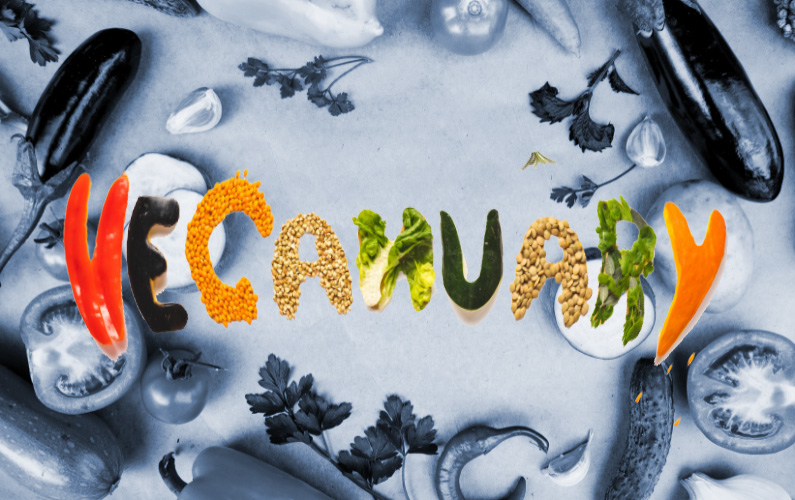- Veganuary celebrated its 10th anniversary in 2023 with a record number of people taking the challenge to avoid meat for the first month of the year.
- Our media analysis suggests that PR and comms pros should strip vegan food of its premium connotations amid the cost-of living crisis, while partnering with brands that share desirable associations to gain more media exposure.
- PR teams should also make vegan options less about limitations and more about possibilities, while keeping track of the new Regenuary trend.
View a one-page infographic summary of the analysis
As Veganuary returned for the tenth year running, this year’s sign-ups to the plant-based pledge have hit a record rate at one person every 2.4 seconds. This Veganuary also saw a record number of mainstream brands release new and exciting products.
To see what we can learn about vegan PR and comms from the media debate around the challenge, we analysed 470 English-language articles published in January 2023. Here are our main findings:
1. Strip vegan food of its premium connotations
Our analysis found that Climate change was the largest topic in the discussion around Veganuary 2023, just like last year. Many media outlets noted that avoiding meat and dairy is considered to be the biggest single way someone can reduce their impact on the planet.
However, there was a new topic this year – the Cost-of-living crisis.
Many articles asked whether it’s possible to go vegan amidst inflation, referencing studies showing that cost is one of the main barriers cited by those wanting to try and eat more vegan and plant-based meals.
A number of commentators worried that the cost of living crisis will make consumers deprioritise vegan products. The main reason is that vegan groceries have long suffered from a perceived (and in some cases actual) price barrier. Inflation and the cost-of-living crisis, therefore, threaten to make the intention-action gap worse as consumers juggle their priorities.
However, PR practitioners can use the crisis as an opportunity to frame vegan diets as budget-friendly. For example, good ways of both saving money and eating sustainably are cooking with food scraps and making a more conscious effort to waste less food.
Supporting the move to plant-based diets is also a nice way to both provide households with more acceptable food prices and reduce emissions impact. Presenting vegan eating as a budget option can ultimately help to do away with the perception that vegan products come with a price premium.
To keep sustainability on consumers’ agendas as prices rise, brands need to make it a problem that has direct relevance to their lives which requires urgent action, approaching communication differently while making sustainability accessible across all levels of the price spectrum. PR pros can make the planet personal by bringing the issue down from corporate, political and environmentalist speak to be discussed with more of a human touch.
2. Partner with brands that share the right associations
With a whole array of promotional opportunities available to plant-based brands, from on-pack contests to charity campaigns and experiential marketing, PR pros capitalised on Veganuary with diverse campaigns. As ever, pinpointing the right method lay in understanding internal brand objectives and external factors including the audience and the activation environment.
We found that partnership campaigns managed to get the most media attention this year. For example, Burger King became the most influential company in the media debate by celebrating Veganuary with a new plant-based Bakon King range, featuring a partnership with French plant-based bacon producer La Vie and dairy alternatives company Violife.
We determine an organisation’s media impact in the context of a topic by looking at its media influence score calculated in terms of coverage by high-profile media outlets, topic relevancy score measuring its contextual relevance, and media visibility as measured by the number of mentions.
The second most influential company, McDonald’s, also gained exposure via its partnerships – it teamed up with vegan brand Beyond Meat to introduce a new Double McPlant in all restaurants in the United Kingdom and Ireland.
Meanwhile, Starbucks worked with the plant-based company The Vegetarian Butcher—which is also a supplier to Burger King—to develop vegan beef for its new No’Beef and Red Onion Focaccia sandwich on its menu.
Partnership marketing presents a way to tie up with brands that share desirable associations within shoppers’ minds, thereby allowing them to establish or reinforce perceptions. Partnerships can help tap into consumer motivations; encouraging health perceptions, creating associations with activism through charity tie-ups, dialling up premium and special occasion perceptions, or appealing to a youthful demographic with a fitting brand.
3. Make vegan food less about limitations and more about possibilities
PR and comms teams have much to learn from content creator Tabitha Brown, who has taken things to a whole new level effectively building a lifestyle empire from social media videos. In 2020, she created a TikTok account sharing vegan cooking videos and inspirational pep talks. Her content is wildly successful, with over 9 million followers across Instagram and TikTok.
She also emerged as the most influential spokesperson in our media sample:
It’s interesting to see how she frames vegan food, presenting it not as a limitation to avoid meat but rather as a gateway to exploring new flavours.
Brown teamed up with Target for her third exclusive collection which included nearly 100 new items, with everything you need for vegan cooking and entertaining, from meat-free sausages, snacks, and dairy-free dips to serving dishes, cooking utensils, and even a cutting board etched with one of Tabitha’s iconic catchphrases.
From her simple recipes to her words of encouragement and positive nature (she compares potato wedges to a warm hug), Tabitha shows the world that going vegan is not only easy but also fun.
The abundance of offerings ensures that everyone will find something to capture their interest, and the collection’s price tag is equally as intriguing. Many of the items are under $10. Given the continued conversation over food costs and conscious spending, this choice makes it approachable for a larger group of shoppers.
4. Impress in Veganuary and activate throughout the year
The spotlight on issues like climate change, animal welfare and public health gets greater and greater every year. As an occasion directly tied to these issues, Veganuary will persist to grow in the near future although may be surpassed by other endeavours. The population is already turning more toward a ‘flexitarian’ lifestyle and Veganuary may be one entry route leading to the adoption of this lifestyle.
Long term, the event may return to the fringes, as the popularity of the part-time plant-based lifestyle amps up. Veganuary triggers a moment-in-time, short-term dedication to a new lifestyle, packaged in an easy-to-digest structure for shoppers, supported by retailers and engaging brand activity. However, it can also be rough and challenging. Veganism can be perceived as a restrictive and demanding lifestyle to suddenly switch into, and trialists can find themselves unable to remain fully engaged during the month, let alone beyond.
Clearly, brands who activate in Veganuary have a highly committed audience, but brands will benefit from thinking more widely – more activation beyond Veganuary with messages that welcome a broader audience. If they can impress in Veganuary and activate throughout the year, they’ll have a greater opportunity to keep this audience buying and capture the general stream of shoppers who find themselves consciously or unconsciously buying into a more plant-based lifestyle.
5. Keep track of the Regenuary trend
The success of Veganuary sits alongside a wider trend of increased plant-based consumption, but Veganuary is being increasingly challenged by ‘Regenuary’.
This fringe movement appeals to consumers’ environmental conscience, steering people towards regenerative agriculture by aggressively questioning the all-positive image of veganism.
Regenuary argues widespread vegan ingredients like soya, maize, avocados and nuts have a particularly damaging environmental impact. It emphasises that animal-free trade-offs can be at odds with why the consumer is making their purchase.
The negative environmental impact of growing vegan ingredients is what made terms like “regenerative farming” among the top keywords in the Twitter discussion during Veganuary 2023:
Similarly, Februdairy is the dairy industry’s progressive movement against what it believes is an incorrectly generalised view of the industry. The campaign tackles negative misconceptions around dairy, such as poor animal well-being and environmental impact, promoting progressive and positive practices that many ‘alternatives’ fall short on.
Animal-led grocery brands will further expand efforts to stem the influence of the plant-based movement. Expect to see brands in this space take steps to communicate why they’re ‘good’ options, including messaging on how they’re supporting animal welfare and observing good agricultural practices that don’t damage the environment, unlike some alternatives. For successful execution, it is crucial that brands cater to consumer motivations for switching to plant-based alternatives – health, animal welfare, environment or a combination.

